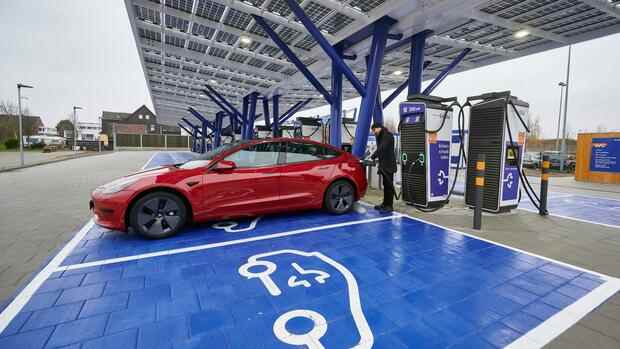Around 300 new charging points are currently being installed every week – far too few in the opinion of the VDA.
(Photo: dpa)
Berlin The German auto industry sees the ramp-up of electromobility in Germany at risk. The reason given by the President of the German Association of the Automotive Industry (VDA), Hildegard Müller: “Germany is extremely lagging behind when it comes to expanding the charging infrastructure for e-cars.”
Müller told the German Press Agency: “In order to actually be able to achieve the number of e-cars that the federal government provides, around 2000 new public charging points would have to be installed every week – in fact there are only 300. In plain language: The pace has to increase sevenfold. “
In addition, from Müller’s point of view, the wallbox program should be extended, which promotes the installation of a charging point in the garage at home. The state funding for this is exhausted, and applications can no longer be submitted to the state development bank KfW.
A growing customer need will be to charge quickly and cheaply, according to the VDA President. “The charging infrastructure has to run ahead of the e-car population. This is the only way to gain consumer confidence and encourage people to invest in an electric car. “
Top jobs of the day
Find the best jobs now and
be notified by email.
The traffic light coalition made up of the SPD, the Greens and the FDP has set itself the goal of at least 15 million fully electric cars by 2030. According to the Federal Motor Transport Authority, 309,000 pure electric cars were registered as of January 1, 2020, plus around 280,000 plug-in hybrid vehicles that combine an electric drive with a combustion engine. New registrations of all-electric cars and plug-in hybrid vehicles continued to rise significantly in 2021, also due to higher government purchase premiums.
Plug-in hybrids should play a bigger role
“The auto industry can build 15 million e-cars,” said Müller. “But consumers will only accept them if they can rely 100 percent on being able to charge their car easily anywhere and at any time.”
Plug-in hybrids would play an essential role in climate protection for the next few years, according to Müller. The average consumer covers 37 kilometers a day, a plug-in hybrid can do that in electric driving mode.
“If there are longer distances, worries increase. With the plug-in hybrid, there is no fear of range when driving long distances or the charging infrastructures that are still incomplete. If necessary, it can run on both electricity and petrol or diesel. That simplifies entry into e-mobility for many people. “
In contrast, plug-in hybrid vehicles that combine an electric drive with a combustion engine are criticized by environmental and climate associations. It is controversial how much they are really driven in purely electric mode.
According to the plans of the Ampel coalition, there should be a reform of state funding from 2023. Then only electric vehicles that have been shown to have a positive effect on climate protection should be funded. This should be defined via the electric driving portion and a minimum electric range.
Record sums for digitization and new drives
Müller warned in transport policy that citizens with low incomes are disproportionately burdened. “The high prices for energy, especially for gasoline, are already pushing many to their limits. Mobility must always be accessible and affordable for everyone. The commuter allowance is an important social compensation. It should exist and be adapted to the development of costs. “
Regarding the situation in the industry, Müller said there was light and shadow. “The positive thing is that we have full order books and of course we want to serve all of them. The German auto industry is investing record sums in this. By 2026, 220 billion euros will go into digitization, new drives and electromobility. That is a huge sum that has to be earned again. “
However, the global shortage of semiconductors and raw materials continues to have a negative impact on production: “According to the current figures, we are still below the bad values of the crisis year 2020. Hopefully the situation should ease in the second half of 2022.” new registrations in Germany fell significantly this year.
More: Toyota is increasing the pace of electric cars – and is relying on a superior battery
